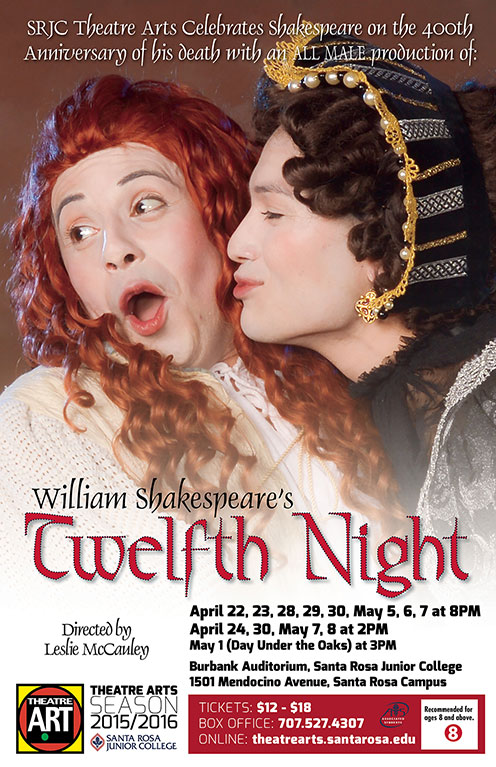William Shakespeare’s “Twelfth Night” is usually about a woman pretending to be a man.
But in the Santa Rosa Junior College theatre arts department’s version, the woman pretending to be a man is actually a man pretending to be a woman, who staves off the attentions of a woman, who is also actually a man pretending to be a woman, while trying to woo a man who is pretending to be – another man.
And if that made you go cross-eyed, don’t worry, it all makes sense.
“Twelfth Night” is one of Shakespeare’s seminal comedies about mistaken identity. Fraternal twins Viola (Matt Heredia) and Sebastian (Cooper Bennett) are separated at sea, and each thinks the other is dead. Viola disguises herself as a boy named Cesario, looking almost exactly like her brother, and courts the fair Olivia (Kot Takahashi) for the sake of her master, Duke Orsino (Evan Held), who she’s in love with. Olivia promptly falls for “Cesario,” who of course is a bit taken aback.
Things snowball from there, as our hapless cross-dressing heroine deals with a love triangle while Olivia’s drunk uncle, Sir Toby Belch (Richard La Rosa), servant Mariah (Daniel Banales) and hopeless suitor Sir Andrew Aguecheek (Erin Galloway) all conspire to humiliate her stuck-up steward Malvolio (David McCullough). And that’s not going into Sebastian’s return, or Feste the Fool (Noah Sternhill) weaving in and out of all the various plotlines that eventually collide in a comedy of errors.
Shakespeare’s works have been set in nearly every place and time – the 1996 movie adaptation of “Twelfth Night” was set in what appeared to be Victorian England – but for this, the 400th anniversary of the Bard’s birth and death, the theatre arts department decided to go back to the beginning. Not only is the play set in the time it was made, great pains were taken to make this performance authentic to how it was originally played.
The program lists all the ways the play stays true to its early days. This includes the stage having chandeliers with real candles hanging overhead, just like the first indoor theaters, two booths onstage where special guests can watch the play firsthand, real musicians located at the top of the stage, girls wandering around selling oranges during intermission and a liberal use of white face paint to express beauty.
But unquestionably, the most notable use of traditional stagecraft is that every role, including the women, is played by a man.
That’s not to say it’s the only notable thing – the actors do a great job of getting laughs out of the audience, partly through line-delivery and pratfalls. Shakespeare’s dialogue can be impenetrable to modern audiences, but broad physical comedy is practically universal. Indeed, some of the funniest moments have no dialogue at all. One such scene is between Held’s Orsino and Heredia’s Viola. Orsino is starting to fall for Viola, but is still unaware she’s a woman, leading to a scene were he constantly approaches and then backs away from a receptive Viola, clearly very confused with himself.
Perhaps the best performance is Takahashi as Olivia, who starts getting laughs in his first scene just by walking across the stage. Whether it be his high-pitched voice as his character shrieks at Heredia to love him, or his overly exaggerated demeanor as he acts more and more the idiot as Olivia falls more in love, Takahashi owns the stage every time he’s there.
If there’s a criticism, it’s that there are no subtle performances here. While some are more broad than others, they everyone hams it up to various degrees. While it works, since this is supposed to be a screwball comedy, it might get a bit overbearing to some audiences.
“Twelfth Night” hits the sweet-spot for both casual audiences and Shakespeare aficionados. The latter will appreciate the time and effort the play puts into recreating the original experience, and the former will appreciate the facial expressions and Chaplin-esc antics. “Twelfth Night” will continue through April 28-30 and May 5-8 at Burbank Auditorium, with a special performance at 3 p.m. for Day Under the Oaks.
Check http://theatrearts.santarosa.edu/current-season for specific times and how to purchase tickets.




